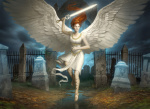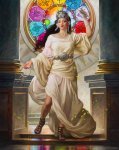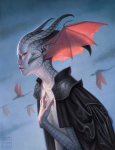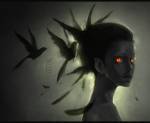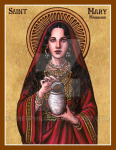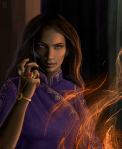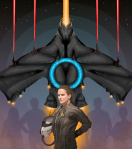Galadriel Coffeen's Blog, page 3
June 29, 2021
The Drachon
“Keltorax!” Kelta shouted.
The men aboard the ship spun around, looking for the owner of the voice, and spotted Kelta standing down on the pier. They gave her curious looks that changed to stares as they saw what she wore around her neck.
“I have a letter for Haias Ganat,” she said calmly, but keeping the authoritative ring to her voice.
“I’ll call him,” one of them said, and gave her a hasty salute as he ran down the nearest hatch. It was the trophy hanging from her neck that earned her the salute. A travel-worn fifteen-year-old wouldn’t normally merit any respect from the warriors of a mercenary ship like the Keltorax.
Kelta waited patiently on the pier, looking up at the small ship. It was a suitably ordinary vessel: sharp and narrow in the prow, with triangular blue sails and a long row of oar ports along the hull. The only unusual feature was the skeleton of a drachon mounted as the ship’s figurehead, with its eye sockets painted red and its long claws and fangs painted gold. Kelta touched the matching fangs that hung around her neck on a leather cord. She didn’t believe in omens, but it felt right that she had killed her own drachon just before reaching this port and this drachon-ship.
The man who had gone in search of the captain re-appeared, followed by an enormous man with unbraided hair that flew around his stern face like a lion’s mane, shining gold in the sun. His eyes were bright blue, his cheeks tanned and scarred. The large man, presumably Haias Ganat, strode across the deck and came to the head of the gangplank, looking down at her.
“Pharon says you have a letter for me?” he asked. His eyes lingered on the trophy around her neck before moving back to her face.
“From Grand Haias Kastor,” Kelta said, and all along the rail, the watching men started whispering eagerly to each other. Kastor’s name never failed to get a reaction.
“Well, then, you’d best come aboard,” Haias Ganat said. Kelta followed his gesture up the ramp, her hand darting into her bag to retrieve the scroll tube as she did so. She held it out to Ganat as she reached the weather deck, and he took it, examining the embroidery around the cap with interest. “Did you come all the way from Poravia to deliver that?” he asked.
“He asked that you read it in private,” Kelta said, bypassing the question.
Ganat’s eyes widened with surprise, but he nodded. “I’ll read it in my cabin, then. Wait here.”
He returned the way he’d come, and Kelta stepped aside to avoid blocking the ramp. She purposefully moved away from the men clustered by the rail. Most of them reluctantly returned to their work, but a couple lingered near Kelta. One was the man who had run to fetch the captain, a middle-aged fellow with the carefully not-listening air of someone looking for gossip to spread — Pharon, the captain had called him. The other was a boy about Kelta’s age, his cheeks soft with youth and his limbs too long and gangly for his own good.
They tried to start a conversation, but Kelta barely heard their attempts at introducing themselves. She stood stiffly and kept her expressionless gaze fixed on the hatch where Haias Ganat had disappeared. After a moment, the pair gave up trying to talk to her.
“Now that’s discipline, Exion,” said the older man, Pharon, sounding half approving and half frustrated. “She hasn’t moved a muscle since she came aboard. You learn discipline like that, and you’ll finally beat Samos in a sparring match.”
“What does standing still have to do with sparring?” Exion asked.
“See how she doesn’t even look around?” Pharon said. “She doesn’t even shade her eyes against the sun. I doubt there’s anything in the world that could distract her. She’d never look away from her target, not with focus like that. And if she does look away, it’s probably a trap.”
“Oh,” Exion said, sounding embarrassed at his ignorance. Kelta could practically hear him flushing. She was fighting a blush of her own at the praise. Pharon was probably trying to get a reaction from her, though, and that knowledge helped her keep tight control over her feelings.
“She’s not even blushing,” muttered Pharon. “Like she hears people saying such things all the time.”
“Well, someone her age who walks up here with a trophy from one of the Four Teachers had better be talented enough to hear it all the time,” Exion said admiringly. If he added anything more, Kelta didn’t hear it: at that moment Ganat’s head poked up from the hatch and he caught Kelta’s gaze.
“Kelta, come down to my cabin, please,” he called.
Kelta crossed the deck, concentrating to compensate for the gentle roll of the harbor waves beneath the hull. She had been to sea before, but not recently; it would take her some time to get her sea legs again. She followed Ganat down the ladder into a surprisingly small cabin. The ships Kelta had been on before had large stern cabins with long tables for the captain to entertain guests, but Ganat’s cabin was cramped by comparison, with only a small square chart table, two chairs, and a padded bench under the stern windows. Doors to either side presumably led to even smaller spaces for sleeping and whatever else filled a captain’s time. Maybe one of the rooms was storage for charts and navigational instruments.
Ganat circled the table, where Kastor’s letter lay on top of several maps, and took the chair facing the door. Kelta closed the door behind her and stood to attention.
“Please, sit.” Ganat gestured to the chair across from him. Kelta saluted him formally, then drew out the chair and sat down. She found herself moving carefully, measuring each step and gesture. Her heart beat faster as the unhelpful voice in the back of her mind asked her quietly what she would do if Ganat refused Kastor’s request. That was extremely unlikely. But — what if he did?
Haias Ganat glanced down at the letter again, then back up at her. His eyes went to the ancestral pattern embroidered into the breast of her jacket with colored threads and beads. “You don’t show much,” he said after a moment. “But what you do show is impressive.” He raised an eyebrow at her, inviting her to explain why she only showed her clan, school, and teacher — Grand Haias Kastor himself. Kelta said nothing, but lifted one shoulder in a shrug.
“Not very talkative, are you?” Ganat said dryly. “I suppose you let your trophy do the talking.” He eyed her necklace of drachon fangs again. “Interesting, that your first trophy is a drachon when you’ve clearly studied far more snake style,” Ganat noted, “but I suppose it would be hard to meet a fathom snake if you haven’t gone to sea much before?”
Kelta gave a slight nod of agreement but declined his invitation to share more. As much as she wanted this position, she valued her anonymity more. He would either have to take her at Kastor’s word, or not at all.
Ganat sighed, visibly frustrated but not angry. He looked down at the letter, then back up at her again. “Kelta, if I’m going to make you a sorhaias on my ship, I need to know a bit more than what Kastor says. I’m fully prepared to take you on at his word; I believe him when he says you’re the finest student he’s ever trained. But then, why would his finest student want to become an officer on my obscure little ship instead of working your way up through his school or building a school of your own?”
Kelta pursed her lips. It wasn’t an unreasonable question, nor was his concern for his crew unreasonable. He wasn’t even asking her for important information, just some sort of assurance that she did, in fact, want to be here and serve as one of his officers. An unwilling sorhaias would be frustrating at best, dangerous at worst.
“I met the drachon on the Path of Autumn,” Kelta said.
Ganat’s expression instantly softened. The Path of Autumn was meant to guide people through grief. “I see,” he said. “And having walked that path, you don’t want to return to Kastor? I’m not sure I know anyone who would pass up an open invitation to study with him.”
Time for some calculated, empty truth. Kelta had found that there were many ways to keep a secret, but the two she favored most were plain silence or measured revelations of truth that satisfied curiosity without actually revealing anything. She had practiced both for years and considered them as much weapons as the two short swords belted at her hips.
She took a careful breath, glanced away from Ganat, let her gaze drop to the table, then slowly looked back at him without quite meeting his gaze. “I’m — I’m not ready to go back,” she said, letting her genuine weariness and pain seep through just enough to let Ganat glimpse the constant struggle of keeping her feelings under control.
Understanding filled Ganat’s face. Understanding and compassion. “It’s too familiar, I suppose. After a great loss — it can be hard to return home. I hope you can go back someday. It would be a great privilege to support you on your return to Kastor’s tutelage. But in the meantime, you are family, so you’re welcome aboard the Keltorax.
“Kastor tells me you have little experience at sea, but I know I needn’t question your fighting prowess. I’m going to place you before the mast for at least a season so you learn the business, but after that, unless you’re stunningly bad at sailing — and I’ve yet to meet someone who can’t be taught at least something of the trade — I see no reason to waste your skills by keeping you there. You may spend more time as a sorhaias than some others to make up for coming late to the trade, but I promise it will be time well spent.”
Kelta nodded, a remarkable amount of relief settling into her stomach. She allowed a little of it to show, and Ganat’s lips quirked into a smile. “You’re the only woman I have aboard, so even though you’re starting before the mast, I won’t make you berth with the seamen. There’s a small passenger cabin you can have. It’s not much, but on a ship this small you can’t expect more than that. You’ll work and mess with the rest of the crew, though. I’m not sure what considerations you’re accustomed to in Kastor’s school, but I run a fair ship. You’ll advance and earn favors based on your skills and character, not our relationship or your history.
“However, you will be treated with the respect due a woman aboard this ship. If anyone so much as gives you an inappropriate look, I want to hear about it. And—” He picked up the letter and rolled it back up, making sure to draw her attention to it— “you are my niece, even if we haven’t met before, and you’ll have the respect that relationship merits.”
He slid the letter back into its tube and tossed it behind him onto the bench. “We’re planning to set sail by the end of the week to accompany a convoy of Neborite merchants back to the far western coastlands. They’ve had some problems with Alokite pirates crossing the open mouth and circling around to prey on them at the cape. When can you be ready to sail?”
“Now,” Kelta told him.
Ganat gave her small shoulder bag a thoughtful look. “You travel light, I see. Well, then, move into the cabin when we’re finished here. I’ll show you where it is. Kastor asked that I not question you too closely or try to find out too much about you, so I won’t, but it is my habit to write to the parents of my sorhaiasi before we set sail. You’re not officially a sorhaias, but I mean to make you one as soon as you learn the basics of shipboard life. Do you have someone you’d like me to contact?”
Kelta’s lips stiffened and she felt herself drawing back as she shook her head.
“No one?” Ganat asked, mildly surprised.
Kelta shook her head again.
Ganat frowned, and again glanced at her family pattern — or rather, the lack of any family connections stitched into her pattern. “Kelta, are you in some danger that I need to be aware of? Something that might affect the safety of my crew? I can protect you, and I’m more than willing to do so. You are, after all, my niece. But I need to know.”
Kelta shook her head. Her mouth felt suddenly dry and she let her tongue flick across her lips to moisten them as her gaze darted away from his again. The drachon teeth hanging over her collarbone clinked with the motion, and she drew a sharp breath, feeling as if she was drawing from the strength of the drachon she’d killed. “I have walked the Path of Autumn,” she said firmly. “There is no one to contact.”
Ganat’s eyes widened, then softened again. “I see,” he said softly. “Your whole family — I’m sorry for your loss, Kelta.”
Kelta swallowed and nodded her appreciation of his misplaced sympathy.
Ganat nodded again, then stood up. Kelta followed suit. “I’ll show you to your cabin,” he said. “Then I suggest you get yourself a couple more sets of clothing. Speak to my quartermaster about other equipment you might need. I’ll pay for everything. You’re family.”
Kelta followed him to the tiny closet of a cabin and set her bag down on the bunk. Ganat disappeared briefly and returned a moment later with a short, graying man with twin tattoos of dog faces on either cheekbone. “Gaphys, my quartermaster,” Ganat introduced him. “See she has everything she needs and help her get settled.” He nodded to Gaphys, then to Kelta. “I have business to finish ashore, but I’ll inform the officers about you before I go. Speak to any of them if you need anything.”
Kelta nodded, then saluted him. The merest hint of a smile played across Ganat’s lips as he watched the precision of her salute. Then he shook his head again and walked away.
“You studied with Grand Haias Kastor himself, eh?” Gaphys asked eagerly as Ganat left.
Kelta nodded.
There was a moment’s awkward silence as Gaphys waited for her to say more; then he cleared his throat and continued, “Well, you’ll need the key for your chest there,” He reached into his tunic and nodded toward the bunk, which had a somewhat battered sea chest waiting under it. “Passengers don’t usually have their own chests, so we keep that one here. You could replace it if you prefer, but for now, here you go.” He handed Kelta a small iron key. “And if you don’t have it already, you’ll want a sailor’s kit, and some tough needle and thread for repairs. The chandlery next to Amphia’s on the Dolphin Temple street has what you want. You’ve got good shoes, and I assume you know your business with those swords. No need for a razor, I suppose…” He continued detailing a list of equipment he thought Kelta might need. It wasn’t a long list; sailors had few needs that weren’t provided by their floating homes. Kelta mentally added a few more items like soap, shampoo, a good comb, and a writing kit.
“Now, Ganat said I was to give you the coin for all this.” Gaphys’ hand darted back inside his loose tunic, overflowing with bulging items that really should have gone in pockets.
“I have money,” Kelta told him.
Gaphys raised an eyebrow. “When your captain offers to pay for something, most people jump at the chance.”
Kelta hesitated, wondering if Ganat would be offended if she didn’t let him pay for her needs.
“You’re family,” Gaphys said, watching her hesitate. “He’ll take care of you. Save the coin to get yourself something nice in Nebor.” He pulled out a rough leather purse and counted out a handful of square Taxian coins. He didn’t give them to her directly; it was rude to put money into someone’s hand. Instead he laid them on the tiny writing desk. “Get the good quality stuff. Can’t have the captain’s niece falling to threads after the first voyage.”
Kelta nodded, and the man gave her a friendly smirk. “Real talkative, aren’t you? We’ll break you of that habit in no time, I promise. Sailors gossip like old wives, you know. Need someone to go with you?”
Kelta shook her head, and Gaphys shrugged. “Well, I suppose I’ll see you aboard later, then. Good luck.”
He left Kelta to get settled in. She locked her bag and her trophy necklace in the chest under the hanging bunk, then unfastened the chain around her neck that held her lucky stone and slid the key onto it. The little metal key slid down the chain to rest against the tear-drop shaped piece of jet, and she put it back around her neck.
The chest was secure enough — or would be when she had anything worth securing. She went to the door and inspected it. It had a simple latch on the inside. Kelta frowned, displeased by how easy it would be to flip from the other side. She wondered how much attention it would draw if she asked the ship’s carpenter to put a proper lock on the door. But such a move would alert everyone aboard that she didn’t trust them, which would only heighten curiosity.
Kelta needed to assimilate; it was the only way to maintain anonymity. She would simply have to get used to leaving the door unlocked, just as she would have to get used to sharing the head with men. She had prepared herself for that lack of privacy as much as possible, but she knew it would be difficult.
But she’d get used to it. She had to. Aboard ship, in close quarters, she couldn’t keep thinking of every man as a threat. She couldn’t run away from the men she worked with. That was one of the reasons she’d chosen to come here. Shipboard life would force her to face her fears. It would teach her a new kind of strength.
And maybe someday, like Haias Ganat had said — maybe someday she’d be ready to go home.
March 17, 2021
Sun Cakes
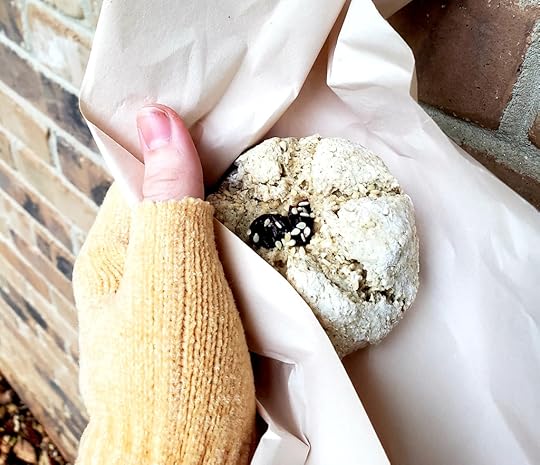
Pretty unwrapped the scrap of paper to reveal the steaming sun cake, with a sunburst cut into its top and raisins embedded in the center. Her mouth started watering at the scents of butter and honey and spices. Her family could never afford to bake with spices, so Pretty only tasted ginger and pepper once a year, at Dawn Festival. She blew on the hot roll, then broke it along the sunburst lines, popped a section into her mouth, and savored the burst of sweetness followed by the peppery aftertaste.
To make your own Sun Cakes:
1/3 cup butter1 cup milk2 tablespoons instant yeast1/3 cup honey1/2 teaspoon salt1 large egg3½ – 4cups all-purpose flour2 teaspoons ground ginger2 teaspoon black or white pepper2 tablespoons butter(optional) sesame seeds(optional) dried or candied fruit, finely chopped(optional) whole or roughly ground peppercornsPreheat oven to 400 F. Lightly grease a sheet pan or a 9×13-inch baking dish.In a small saucepan, melt butter, then stir in milk. Bring mixture to “bath-water” temperature, hot but not unpleasant to touch. Do not allow it to boil.Remove from heat and add yeast and honey; stir to combine.In a mixing bowl combine salt, ginger, pepper, and 2 cups of flour. Add milk mixture and egg and stir well. Add remaining flour 1/4 cup at a time until dough pulls away from the sides of the bowl. Dough should remain sticky.With floured hands, shape dough into 10-12 rolls, and place rolls on prepared baking sheet.Cover and let dough rest for 10 minutes in a warm spot.Cut a sunburst shape in the top of each roll. Optional: decorate the tops of the rolls with sesame seeds, peppercorns, or dried/candied fruit.Bake for 10-12 minutes, or until golden brown.When rolls are done baking, brush with 2 tablespoons melted butter. Serve warm.March 10, 2021
To Prove the Killer Existed

My shoulders tightened as the train pulled into the station. My heart banged in my ears and my fists clenched in the folds of my skirt. Part of me was convinced the wheels would skip off the tracks at any instant. A shriek of useless brakes, a lurch, and then the impact of the runaway locomotive smashing through the platform–
But nothing of the sort happened. The train slowed, then squealed to a stop alongside the platform. I let out my breath and realized I’d been holding it. The instant the conductor opened the door, I sprang to my feet and hurried out onto the platform.

I felt foolish for being so nervous, but this was the first time I’d taken a train since Father’s death. His train had failed to stop at the station. It had plowed through a crowded platform, killing several people and injuring dozens more. It had been six months since the funeral, and Mother still refused to go within sight of a train station. She’d begged me not to take the train into town today. She was absolutely convinced that she’d never see me again if I did. She’d almost convinced me, but I was not going to spend the rest of my life afraid of trains. I was not going to hide away in the countryside and languish in my grief like Mother.
Because Father’s death wasn’t an accident. I didn’t care how many people told me otherwise. The Station Crash was not an accident. I’d read everything I could find in the papers. I’d spent my pocket money sending telegrams to the police, begging for more details. I’d scandalized several railway officials by showing up unescorted in their offices to ask for diagrams of locomotives. I hadn’t found anything, but that didn’t mean there was nothing to find.
My heart started racing again as I looked out through the station’s wrought-iron gate into the bustling streets. An eighteen-year-old girl had no business looking for answers alone in the big city. I should be attending dances and making eyes at boys. I should be helping Father organize his notes and label his new medicines. But instead, here I was in my plainest and most professional-looking skirt and shirtwaist, with my curly red hair pinned back severely instead of piled artistically on top of my head. Here I was hoping to find a job that Father never would have approved of.
If nobody would believe me that he had been murdered, I’d have to prove it myself. That meant getting access to every detail the police knew about the Station Crash. And that meant joining the Royal Investigative Service. I had no idea what they required of their agents. I had no idea if they even accepted women. But I had to try.
Mother was welcome to hide in her parlor and weep for the unfairness of the world. I wouldn’t do any such thing. Father had taught me better. “Sometimes it takes years to understand a new disease,” he told me. “And it might take years more to find a medicine that does any good against the sickness. But it doesn’t matter how hard the process is or how long it takes. We can’t give up until we find the answers.”
I didn’t have to be a doctor to take his advice. A murderer was as deadly as any fever, and needed just as badly to be stopped. I clenched my fists against the sides of my skirt, straightened my back, took a deep breath, and stepped through the platform gate onto the street. It didn’t matter how hard the process was or how long it might take. I was going to prove the killer existed. I was going to find out what really happened to Father. And I wasn’t going to give up until I had all the answers.

Want to read more?
Get a copy of The Case of the Dragon-Bone Engine or read the first chapter online!
February 12, 2021
The Eastern Informer
Fiveday, 7th Firstmonth, 315
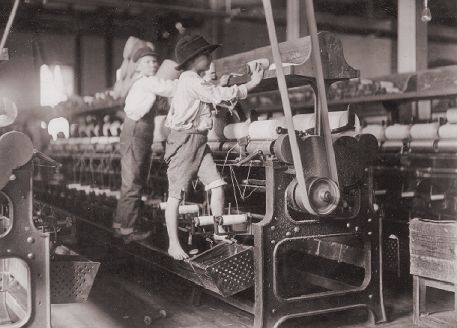
ELSMOORE FACTORY GRAND OPENING!
By Connie Searden
The Elsmoore Corporation has opened a new textile factory in Dreth with great fanfare. This facility is the largest Elsmoore has yet built and boasts an impressive seventy-eight looms. At the opening ceremony, Mr. Elsmoore promised his new factory will make it possible for even the poorest families in Dreth to clothe themselves warmly.
Mr. Brenton Elsmoore, owner of the rapidly growing Elsmoore Corporation, visited Dreth in person yesterday to oversee the opening of his new textile mill. “This is a momentous occasion for the city of Dreth,” he announced. “This factory will provide over two hundred new jobs, not to mention dozens of varieties of high-quality fabrics that will begin appearing in shops within a week!” Mr. Elsmoore went on to describe the innovative loom designs his factory uses. “The details are patented,” he said with a wink, “but I can tell you we’ve incorporated more dragon-bone components for faster, cleaner, and ultimately cheaper production.”
The factory began production immediately on its opening, with nearly a hundred men, women, and children already working the looms. Onlookers were amazed by the small quantity of smoke and soot put out by the mill. Some machinery still relies on coal power, but the large number of magic-driven components makes this mill a far more pleasant addition to the city than most new factories. Mr. Elsmoore asserted that the new mill is also safer for the workers “because there won’t be so much smoke in the air. It’ll be easier for the workers to see what they’re doing, and there won’t be any worries about them catching the sooty lung.” When asked if the faster loom operation created any new safety concerns, Mr. Elsmoore replied, “It’ll take the workers a while to adjust, I’m sure, but as long as they’re careful, there shouldn’t be anything to worry about.”
December 7, 2020
Dragon-Bone Engine Excerpt
CHAPTER ONE
I stepped down from the hansom cab into an ankle-deep slush of snow, soot, and horse leavings, exactly what my boots needed this morning. “Sorry about that, miss,” said the cabby.
“It’s all right.” With the snow piled in the gutter, he couldn’t have pulled close enough for me to step directly to the sidewalk. I handed him my fare before pulling free of the slush, hopping up onto the clean pavement, and scraping my feet clean against each other. The cabby tipped his hat to me but didn’t give me his usual smile. His face looked more careworn than normal, with dark circles under his eyes. I wondered if something was wrong, but I didn’t ask. I didn’t even know his name, and I doubted he’d appreciate me prying into his private life. I turned away as he clicked his tongue at his horse and drove on down the street.
“Excuse me, miss,” said someone behind me, and I sidestepped to let a shopkeeper drag a bright-colored display rack onto the sidewalk outside his door. It was about half past seven, and the city was just waking up. I liked starting my day early. In summer, I usually walked to work and watched the shops open on my way, but the chilly winds and lack of sunlight this time of year made taking a cab far more appealing.
“Morning paper, fresh off the press,” called a voice from overhead. Fairy wings buzzed above the streetlamp, glittering as they caught the light, and I flicked a penny in that direction. I heard the paper-boy’s fingers snap it out of the air. He was getting better at catching.
“Morning, Pip,” I said as the fairy boy dropped into the circle of light cast by the streetlight.
“Morning, Miss Beka.” He landed with a thump and tucked the penny into the pouch around his neck. He’d been growing this winter: he’d match my admittedly unimpressive height if he stopped slouching. I noticed that he’d added mustard-colored fingerless gloves to his usual getup. They clashed with his faded puce jacket and made him look grubbier than usual.
“Let’s have it, then,” I said. “I don’t want to be late for work.”
“You’re an hour early, Miss Beka,” he said with a smile, but he dug a rolled copy of the Eastern Informer from his satchel and handed it over. “It’s all full of that Lord Donovan’s fancy talk,” he said. “Not worth a penny, if you ask me.”
“Maybe not,” I agreed. I tucked the paper under my arm and added, “But be careful who you say that to.” Most people liked Lord Donovan’s “fancy talk,” and most people wouldn’t want to hear a fairy’s opinion about it. Pip would get in trouble one of these days if he kept saying whatever popped into his head.
The antennae above Pip’s pointed ears twitched. He opened his mouth, then thought better of whatever he meant to say. “You might meet my sister today, Miss Beka,” he said instead. “She’s in there right now.” He nodded toward my office.
“I hope nothing’s wrong?” Most people avoided police offices unless they had something to report, but Pip didn’t look upset or worried.
“Oh, no, ma’am, nothing’s wrong!” Pip grinned from ear to ear. “She heard they were hiring a driver for their new motor-car, that’s all. She’s interviewing.”
“Your sister’s a driver?”
His grin somehow managed to stretch wider. “Ma doesn’t think they’ll look twice at a girl, but I bet they’ll hire her. She’s the best driver from her class, you know, and if they let girls — I mean, women — be investigators like you, they shouldn’t have any problem with a girl driver.”
“They shouldn’t,” I agreed. That didn’t mean they wouldn’t, of course. As far as I knew, I was the only woman in the Royal Investigative Service who’d made the step from glorified desk clerk to proper field agent, and it had taken me several years to convince the chief I could manage the job.
“Well, I look forward to meeting her,” I told Pip. Maybe I’d put in a good word for her, just on principle; an agent’s recommendation might give her a real chance of being taken seriously.
Pip tugged the brim of his shapeless cap. “Have a good day, Miss Beka,” he said, then sprang back into the air. His wings spread in a humming silvery blur behind him, and he darted away up the street.
I didn’t linger any longer: the air was biting cold and the wind was picking up. I hoped it wouldn’t snow. We never got more than three or four inches of snow at once, but that was three or four inches too much for my liking. I crossed the dark street, dodging two handcarts and a huge steam-powered motor-car, and emerged into another pool of light outside the offices of the Dreth Branch of the Royal Investigative Service. That title was displayed on an impressive gilded sign over the door, but the building itself was small and unassuming, built of stained red brick.
I walked carefully up the icy steps. The bent old doorman tipped his hat, gave me a sunny smile, and opened the door for me. “A very good morning to you, Agent Finley.”
“Morning, Mr. Turpin.” I returned his smile. Some of my fellow agents still called me Miss Finley, but the doorman never forgot to use my proper title. He never neglected to give me a bright smile, either. It amazed me that someone with such painful, swollen joints and such a dull, thankless job could remain cheerful all the time.
Inside, the first floor of the building was dim and silent. One gas-lamp burned beside a desk near the door, and a vaguely familiar file-sorter glanced up at me as I passed. We nodded to each other — he looked as if he hadn’t gotten much sleep — and he went back to digging through his file cabinet while I wove my way through the maze of empty desks.
I shook out the newspaper as I walked. The single lamp behind me didn’t cast enough light for me to read, but I could make out the large photograph of Lord Lester Donovan the Third beaming at me from the front page. He wore a shiny top hat and a magnificent pair of sideburns that framed a clean, square jaw. I couldn’t deny he was a fine-looking gentleman, even if he was at least fifty, but he always smiled too much. Nobody could smile that often and really mean it.
The lamps were already burning in the staircase at the back of the building. I glanced at the front-page headline as I went up: “Lord Donovan Promises Better Pay for Dreth Workers.” He was always promising things like that for our city, but never delivering. He’d have a hard time delivering if the rumors about his financial troubles were true. There was probably no point in reading his speech. It would be the usual stirring words that made people feel good but didn’t fix anything.
Upstairs, an open office space filled the back half of the building, with several doors leading into smaller rooms toward the street. The lamps on one side of the office were lit, but the space still felt dim and almost cozy. The noises of the street were muffled: the only sounds were the groan of a shifting pipe, the creak of the shutters as the wind pressed against them, and the bubbling of the coffee-pot and the tea-kettle sitting on their two little gas burners in the corner. I paused to take a deep breath of the rich coffee smell, then crossed to my desk, which stood at the border between light and shadow. I took off my cap, and a dozen red curls seized the chance to escape their pins and fall down around my face.
The door to the water closet opened. Donovan stepped out, drying his hands on a blue kerchief, and raised an eyebrow at me.
“I’m not that early,” I said. I was usually the first agent to arrive. It felt strange to come in and find someone else upstairs. “And you have no room to talk; you’re even earlier.”
“My neighbor decided to start repairing his roof at six o’clock in the morning,” said Donovan. I would have been irritated by such a rude awakening, but he seemed vaguely amused. He poured two mugs of coffee and brought me one. “Do you always get here this early?”
I nodded. “The apartment next-door to mine belongs to a pair of sisters who find something new to squabble about over breakfast every morning. It’s quieter here.”
“I’ll leave you in quiet, then,” said Donovan. He returned to his desk; it was only a few feet away, but he was in the area of bright light cast by the gas-lamps, while my desk lay in twilight. It almost felt as if we were in separate rooms. I settled back in my chair and sipped my coffee. As usual, Donovan had brewed it strong and bitter enough to strip paint off a wall.
The hot drink woke up my stomach, which started growling. I pulled a little kerchief-wrapped package from my pocket and unfolded it. When I walked to work, I usually bought breakfast from a bakery I passed on the way, but taking a cab meant making do with whatever Mrs. Warbler served her boarders. My landlady wasn’t a very imaginative cook, and breakfast was the same most mornings. Still, there was nothing wrong with toast and fried ham to start the day.
As I ate, I eyed the stack of paperwork waiting on my desk. It seemed to have multiplied over the weekend. I shifted a few of the papers around, considered doing something about them, then spread the newspaper to hide the whole pile. Lord Donovan’s smarmy grin didn’t improve the view. I glanced up at Investigative Agent Donovan, who had the same strong features and aquiline nose as his father, but without the smile. The thoughtful frown he was currently aiming at his desk looked both more lordly and more trustworthy than his father’s toothy grin.
He must have felt me watching him; he glanced up and gave me a questioning look.
“Just thinking.” I flipped past the front page in search of something more interesting than Lord Donovan’s most recent blather. The top article on the second page was titled “Haverport Hive Sale.” That caught my attention: none of the dragon hives had changed hands in my lifetime. I smoothed the paper and read eagerly:
The fate of Haverport Dragon Hive has been in question since Lord Ethan Haverport declared bankruptcy last month, but his lordship has finally revealed that he intends to sell the hive and has already selected a buyer.
Lord Haverport’s finances have reached a desperate enough state that he is being forced to sell several of his most valuable assets, including his historic manor, his silver-mining interests, and the dragon hive which his family has owned for six generations. “Well, it’s not ideal,” said Lord Haverport when asked about the decision to sell. “Believe me, I wouldn’t give up the hive if I had any other choice.”
When asked about the potential buyers for the hive, Lord Haverport admitted that the other eastern hive owners all made lucrative offers. “Lord Donovan was particularly keen to have it,” he explained, “but Brenton Elsmoore offered a better deal. Honestly, I was a bit surprised he came out ahead, but I won’t complain!” The sale will be finalized at the end of the week, making the Elsmoore Corporation the first company ever to own two dragon hives.
There would be repercussions from the sale — and messes for us to clean up, as likely as not. Anything that turned political tended to fall into the Royal Investigators’ laps. But I’d worry about that when it happened.
I flicked through the rest of the paper. “Promising New Coal Mine” was probably just wishful thinking. They’d been digging holes in the hills for centuries but never finding much. Keldane must have been last in line when natural resources were handed out: we had the dragon hives, of course, but most of the coal, iron, and silver that fueled modern industry had to be imported from Dothan and Arborna.
I skipped past “Celia Donovan Hosting Bell City Charity Ball,” then paused at “Fairy Children Killed in New Elsmoore Factory.” Ever since its grand opening last month, that factory had been plagued with accidents, so many that I’d started wondering if they were really accidents. I glanced through the story: three children had been killed and two injured when the machinery malfunctioned and entrapped them.
I frowned at a quote from Lord Donovan: “Mr. Elsmoore’s disregard for his workers’ safety should not be allowed to continue. It’s deeply concerning that last week’s incident didn’t prompt any new precautions that could have prevented these deaths.” For once, I actually agreed with his lordship, though I had a feeling he only offered his sympathy to make his rival look bad.
“Though the dead may be ‘only fairies,’” the article concluded, “let us not forget that they are also innocent children, young lives needlessly snuffed out by the negligence of the corporate structure, leaving behind parents and siblings who will feel their loss as keenly as any human family.” I glanced at the byline: sure enough, the article was written by Connie Searden. A lot of people disliked her for taking the side of fairies in so many of her articles, but just as many people called her a hero. I figured she was simply trying to cause a sensation; reporters thrived on controversy, after all.
Footsteps hurried up the stairs, and a moment later the chief burst into view, red-faced and disheveled. “Oh, thank Ardevan you’re already here,” he puffed as he crossed the room toward us. “It’s unnatural, you know, showing up early for work on a Oneday morning. Not that I’m complaining.” He pulled off his hat and ran a hand through his thinning hair, then stepped over to the corner table and poured himself a cup of tea. “There’s been an incident out on Barrigan, about halfway between here and Bell City.”
From the way he said “incident,” I knew he meant “crash.” A shiver ran down my back, and I felt myself beginning to tense up. Barrigan Line was the main railroad track that connected Dreth to Bell City. It ran almost perfectly straight across level farmland, with no dangerous curves, no trees to fall across the tracks, nothing to cause a crash. A scheduling error might have caused two trains to collide, but it seemed unlikely.
“It wasn’t an accident,” I concluded.
The chief gave me a sharp look over the rim of his cup. “We don’t know that.”
“What do we know?” asked Donovan.
“Not much.” The chief turned his cup nervously between his hands. He was the sort of man who seemed permanently flustered, but this was different. He looked truly worried this time. “There was an explosion. We don’t know if it was the engine, or if they were carrying some sort of dangerous cargo.”
Donovan gave me a concerned glance. He knew my feelings about train crashes. I’d seen the aftermath of the infamous Station Crash six years ago, when a passenger train plowed into a crowded platform up in Bell City.
But a cargo train was different. There wouldn’t be any passengers. We wouldn’t have to spend the morning digging survivors out of the wreckage or counting corpses. I gave the ghost of a reassuring smile; I’d be fine.
Donovan looked at me for a second longer, then nodded. That was something I appreciated about working with him: when I told him I could do something, he accepted it without question.
The chief was still talking, oblivious to our exchange. “I’ve sent half a dozen telegraphs in the past half hour, trying to find out whose train it was and what it was carrying, but I don’t have any answers yet. You’ll have to work it out when you get there.” He ran a hand over his bald patch again, then looked at me almost pleadingly. “You know about trains, don’t you, Agent Finley? Haven’t you studied old crash investigations?”
I had only studied the Station Crash, but I nodded. “I know a little.”
“Good. That’s good. Now you’d best hurry out and see what’s going on. Take the motor-car.”
“It’s arrived?” said Donovan.
“Came over the weekend,” said the chief. “Ugly great thing, but it’s fast, and that’s what counts.” He looked at his pocket-watch. “They were supposed to hire a driver first thing this morning; they should have someone picked by now. Downstairs, interview room.” He waved us away, then hurried past us and opened the door to his office. The door slammed behind him, and I thought I heard the beep and click of his telegraph machine.
I put my cap back on and shoved my wayward curls up under the brim, then buckled my gun and baton to my belt. I doubted I’d need to use either, but they were symbols of authority. People might ignore the badges pinned to my jacket and hat, but nobody ignored a revolver.
I watched a bit enviously as Donovan clipped his own weapons to his jacket belt. His revolver was a sleek silver-chased work of art, far superior to mine. He also carried a pair of wands, narrow rods of dragon bone about a foot long, each with a wooden handle inset with a rotating silver ring. Donovan’s noble blood gave him some control of magic, nothing like what fairies could do, but more than an ordinary human like me could ever manage.
I consoled myself with the fact that I was a better shot than Donovan, especially when he used magic. Wand-blasts might be impressive, but I had a better chance of hitting what I aimed at.
Donovan put on his cap as well, then tilted his head toward the stairs.
I nodded: I was ready. We went down to the main office space. There were more lights now, and several people had arrived at their desks. We crossed the room to a side door that stood half open to reveal a severe-looking man sitting at a wooden table. I didn’t know him, but his pursed lips and critical eyes didn’t give me a good first impression. I pushed the door fully open; on the other side of the table sat half a dozen young fairies, all looking nervous and hopeful.
“We need the motor-car,” said Donovan.
The interviewer shook his head. “I haven’t had time to test any of them yet, sir. We started later than I intended.”
“Pick one,” said Donovan.
“But—”
I held up a pacifying hand. “This can be the test. If it doesn’t work out, we’ll try someone else.”
“Miss, that’s not how this works. There’s a process in these sorts of—”
“Agent,” I said.
“What?”
I tapped the badge pinned to my jacket. “We need the car immediately.”
The interviewer frowned and glanced toward Donovan, who nodded. The man’s frown deepened. “Well, if I must pick without conducting proper interviews. . .” His eyes moved toward the oldest boy, who had a humorless face and a stiff collar pushing his chin up.
“You.” I pointed to the single girl, sitting straight and attentive at the end of the row.
She jumped slightly. “Me?”
“You’re a licensed driver, right?”
“Yes, ma’am.” She thrust a hand into her pocket and held up a metal tag stamped with a sketchy shape that might have been a motor-car.
“Let’s go, then.” I watched the interviewer’s irritated expression from the corner of my eye and tried not to feel too satisfied about stepping on his proverbial toes.
“Yes, ma’am!” The girl sprang to her feet and saluted like a boy, tugging the brim of her hat. It was a battered messenger’s cap, slightly too large for her and clearly meant for a boy; I wondered if it belonged to someone else. A sweetheart, maybe?
The interviewer stood as well. “Miss, I’m not sure this girl—”
“I am.” His condescending tone made me even more sure. I beckoned the girl to follow us, then turned back to the main room.
Donovan eyed the girl critically, but not with the instinctive disapproval the interviewer had showed. I certainly saw nothing to disapprove of: she was clean and respectable-looking, with an air of determination and intelligence about her. She looked a lot like Pip, with the same round face, snub nose, and ridges of purplish scales along her cheekbones.
“What’s your name?” I asked as we crossed the room.
“Pretty, ma’am.”
Donovan raised an amused eyebrow. It was an odd name, but it fit her well enough: she was pretty, in a girlish way, and she might even be beautiful in a few years.
“What about you, ma’am?” Pretty asked. “And sir? Should I just call you Agents, or what’s the proper way to talk to you?”
“He’s Agent Donovan; I’m Agent Finley. Beka Finley.”
“Wait, I think my brother knows you!” said Pretty. “He’s so proud a proper investigative agent always buys his paper. He calls you Miss Beka. I should remind him to say Agent Beka instead.”
I smiled slightly. Pairing my title with my first name sounded strange, but I appreciated the sentiment. We turned through the door at the back of the building, into the old stable that had stood empty since we retired the horse and its battered old coach a few weeks ago. Now the narrow space held the new motor-car looming in the darkness, lit only by the stripe of lamplight falling through the open door behind us.
The machine was nowhere near as large as the steam-coach cars I was used to seeing. I’d heard all about dragon-bone engines, of course, and I’d seen a handful of the new motor-cars on the streets over the past few months, but I’d never been this close to one.
“Oh, it’s the improved design,” said Pretty. “With the carbide lamps.” She bent down and opened one of the car’s headlamps, then glanced around and spotted the box of matches on a nearby shelf. She lit the lamps quickly, using only one match, then turned to beam at us. “I’m ready when you are, Agents! You won’t regret picking me!”
“Let’s go, then.” Donovan didn’t unbend enough to smile at her, but I spotted the slight crinkle at the corner of his eyes. He liked her enthusiasm, even if he wouldn’t say so outright.
“Yes, sir!” Pretty pulled on a pair of mustard-yellow fingerless gloves that matched Pip’s. Whoever had knitted them wasn’t much good at it. She adjusted her oversized cap, then sprang up into the driver’s box. “Where to, sir?”
“North along Barrigan Line,” I said as Donovan opened the back door for me. The inside of the motor-car was arranged like a carriage, with two benches facing each other and a window separating the passengers from the driver. The whole space smelled like new leather. I chose the seat in the back, so I could see through the front window past Pretty’s head. Donovan sat across from me and shut the door.
In front, Pretty turned around just far enough to give us a bright, almost cheeky grin through the dividing window. “I’m a good driver,” she said. “You can count on me.” The tips of her antennae twitched up and down, nodding in time with her words.
Pretty set her hand on the long lever that stuck up beside her. Most of it was coated with leather, but I glimpsed bare dragon bone at the end, almost hidden by her fingers. “It’ll take a few seconds to build the charge,” she said. She frowned in concentration, and the temperature dropped sharply. My breath misted in the air, and I shivered and fastened the top button of my jacket.
I’d never seen a dragon-bone engine at work, but I knew enough about magic to understand what was happening. Dragons had so much magic in them that their bones continued absorbing energy after death. Pretty was controlling that process, guiding the engine bones to collect a great deal of energy to convert into motion. And the easiest way to collect that much energy was to steal heat from the air around the engine. My fingers started going numb, and I put on my gloves. They were wonderfully warm fleece-lined leather, but they were stained and wearing thin from years of use. I knew I should probably replace them, but they’d been a gift from my father before he died.
“There we go!” said Pretty. The engine coughed to life, and the whole car started humming around me. It was a gentle, polite sort of vibration, nothing like the rattling roar of steam-powered motor-cars and trains.
The car squeezed down the alley between our office and the next building, then pulled out into the street, slowly at first, then faster as a path opened through the pedestrians and horse-drawn cabs. The sky was changing from deep blue to dusky violet, but the streets were still dark. We’d have about five hours of bright twilight today, but this far north, proper sunrise wouldn’t come for another two weeks.
“I’m so glad these motor-cars were invented,” said Pretty. I couldn’t see her face now, but I saw the tips of her antennae dancing above her head, and I knew she was still smiling. “It’s a really good job. It’s not dangerous like the factories, and you don’t even need to be very good at magic. Just keep changing all the collected energy into motion; it’s not so hard. My Pa works one of those new dragon-bone trains, and he says it’s hard to keep the magic in balance with so many bones in the engines, but — but I’m chattering too much, aren’t I? Ma always tells me I should be more careful what comes out of my mouth, especially when I’m talking to my betters. Begging your pardon. I hope I haven’t talked out of turn.”
She turned her head and gave us such an anxious look that I couldn’t help smiling. “It’s all right. But your Ma’s right; you should be careful. Plenty of people would prefer their driver to sit quiet.” I didn’t mind her chatter, but some of the other agents might complain, and that would give the interviewer an excuse to hire one of the boys instead.
Our motor-car’s tires squealed as we turned the corner onto Barrigan Lane, the road that ran parallel to the train line. We passed North Station. The morning passenger train to Bell City should have left by now, but it was still parked alongside the platform, with the locomotive hissing and steaming impatiently. People rushed back and forth across the platform, and I heard at least two men shouting angrily in the time it took us to leave the station behind.
We drove through the last rows of town-houses and past the city limits. Pretty shifted the lever, and the motor-car picked up speed. The temperature dropped further, and my nose and cheeks started going numb. We roared up the straight, empty lane with the light of the headlamps rushing ahead of us. I fought the urge to brace myself against the bench. I’d travelled faster in trains, but the speed was more noticeable in such a small vehicle. The chief had said the crash was halfway between Bell City and Dreth: that meant we had nearly fifteen miles to go, but at this rate, we’d cover the distance in less than half an hour.
Donovan took his hat off despite the cold and ran a hand over his short blond hair to smooth it. His brows drew together, shadowing his eyes so they looked more black than grey, and he ran his thumb slowly back and forth along the brim of his hat where it sat on his lap. He was probably trying to guess what had happened to the cargo train. A train wouldn’t simply fall off a straight track, even if it was moving too fast. That left two options: malfunction or sabotage.
I found myself tapping my fingers rapidly against my knees. Back in the office, my mind had leapt to the possibility of sabotage, but I tried not to let that option settle too firmly into my head. “If we leap to conclusions, we’ll only find what we’re expecting,” I said quietly, and Donovan looked up at me and nodded agreement. It was a warning we’d both heard at least a hundred times during training.
The Royal Investigators who were called to the scene of the Station Crash six years ago had ignored that warning. I’d read their reports so many times I had sections memorized. They’d blamed the crash on engine malfunction, even though they never found anything wrong with the locomotive. They’d simply decided it must be an accident and never looked for another cause. I didn’t intend to repeat their mistake.
We sat quietly for a few minutes. My mind started producing grisly images of what we might find at our destination. There were no passengers, but a cargo train still had a crew. If the engine had exploded, anyone aboard the locomotive—
I stopped that line of thought before it could unnerve me too much. At least nothing had exploded at the Station Crash. The locomotive had skipped the rails and plowed into the platform, dragging the coal tender and the first two passenger cars with it. The coupling between the second and third cars had snapped, so all the fatalities had been in the first two cars and on the platform.
My mother and I had arrived at the platform after the worst was over. We hadn’t seen any of the crushed bodies or the people impaled by splinters of the platform. We’d only seen wreckage, panicking crowds, and shouting constables. And later, the row of shrouded forms laid out behind the station house, and one pale dead face uncovered for us to identify.
Mother hadn’t said anything. She’d gone as pale as Father’s corpse and turned away. I was the one who told the constables his name and signed their report so we could take him home.
“Beka.”
I jumped and looked up at Donovan, feeling guilty for letting my thoughts run away with me. Of course it was natural for this assignment to remind me of the other train crash I’d seen, but I needed a clear head. When we arrived at the scene, I needed my mind to be focused on this crash. “What did you say?” I asked.
Donovan pointed. His thoughtful mood had turned suddenly tense. I looked through the window and spotted a smudge of smoke, black against the lavender sky. “That doesn’t look so bad,” I said.
“It’s still a couple miles away.”
“Oh.”
The cloud of smoke grew larger as we approached. I kept my eyes on it as it moved with the breeze. The wind shifted toward us, and I caught the smell of ash for a moment. It mostly smelled like a wood fire, but with an acrid edge to it that I didn’t recognize.
Lights appeared ahead. There was a low reddish glow and several bright spots of lantern light. The twilight had grown bright enough that I could make out a variety of dim, jagged shapes between the lanterns, but I couldn’t quite identify what I was seeing.
The motor-car slowed, then stopped, and I caught a sharp breath as the jagged shadows resolved into solid shapes. It was the train. Or at least, what was left of the train. Twisted metal and broken wood thrust toward the sky. Beyond the cluster of lanterns, I glimpsed the blocky shapes of undamaged train cars, but everything nearby had been reduced to a charred and shattered mess.
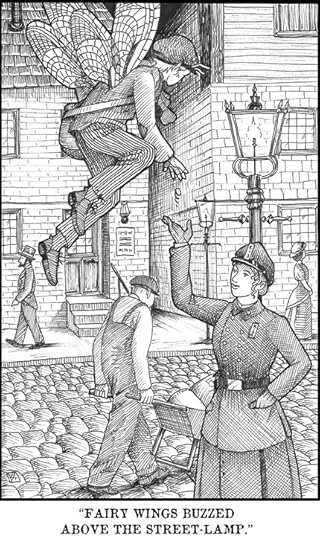
November 1, 2020
Final Draft!
Yesterday I finished the second-to-last draft of The Case of the Dragon-Bone Engine, which brings me into the final push to get the book published by December. I have a number of readers helping me proofread and polish the manuscript right now; while they comment on the book, I’m going to spend most of November working on illustrations. I’ll fly through the final draft in the last week or two of November, since hopefully I’ll only have small adjustments to make at that point, and then I’ll be ready to start putting it all together! It’s going to be a whirlwind ride, but I’ve always worked best with a deadline, and I’m determined to have the book available well before Christmas.
In the meantime, here’s an excerpt from the first chapter and the first illustration!
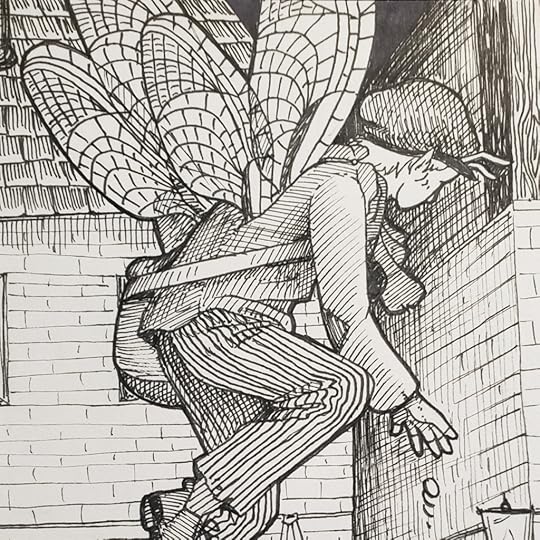
Chapter One
I stepped down from the hansom cab into an ankle-deep slush of snow, soot, and horse leavings. Exactly what my boots needed this morning. “Sorry about that, miss,” said the cabby.
“It’s all right.” With the snow piled in the gutter, he couldn’t have pulled close enough for me to step directly to the sidewalk. I handed him my fare before pulling my boots free of the slush and hopping up onto the clean pavement. The cabby tipped his hat to me and drove away into the dark with one wheel squeaking every time it turned.
“Excuse me, miss,” said someone, and I sidestepped to let a shopkeeper drag a bright-colored display rack onto the sidewalk outside his door. It was about half past seven, and the city was just waking up. I liked starting my day early. In summer, I usually walked to work and watched the shops open on my way, but the chilly winds and lack of sunlight this time of year made taking a cab far more appealing.
“Morning paper, fresh off the press,” called a voice from overhead. Fairy wings buzzed above the streetlamp, glittering as they caught the light, and I flicked a penny in that direction. I heard the paper-boy’s fingers snap it out of the air. He was getting better at catching.
“Morning, Pip,” I said as the fairy boy dropped into the circle of light cast by the streetlight.
“Morning, Miss Beka.” He landed with a thump and tucked the penny into the pouch around his neck. He’d been growing this winter: he’d match my admittedly unimpressive height if he stopped slouching. I noticed that he’d added mustard-colored fingerless gloves to his usual getup. They clashed with his faded puce jacket and made him look grubbier than usual.
“Let’s have it, then,” I said. “I don’t want to be late for work.”
“You’re an hour early, Miss Beka,” he said with a smile, but he dug a rolled copy of the Eastern Informer from his satchel and handed it over. “It’s all full of that Lord Donovan’s fancy talk,” he said. “Not worth a penny, if you ask me.”
“Maybe not,” I agreed. I tucked the paper under my arm and added, “But be careful who you say that to.” Most people liked Lord Donovan’s “fancy talk,” and most people wouldn’t want to hear a fairy’s opinion about it.
The antennae above Pip’s pointed ears twitched. He opened his mouth, then thought better of whatever he meant to say. “Have a good day, Miss Beka,” he said, then tugged the brim of his shapeless cap and sprang back into the air. His wings spread in a humming silvery blur behind him, and he darted up the street, vanishing in the dark for a moment before reappearing dimly above the next streetlamp.
September 19, 2020
Release Dates!
Ever since my decision to self-publish, I’ve been working hard on editing and illustrating my current writing project, and I’ve finally been able to nail down release dates! It’s a daunting step to make the plan public and lock myself into the schedule I’ve set, but here we go.
First I’ll be releasing a short story, “Magic and Motor-Cars, or How a Fairy Moved Up in the World.” Pretty Pinchworth, a young fairy girl from a poor family, is determined to do whatever it takes to learn how to drive a newly invented magical motor-car and earn a better place for herself in life. Along the way, she gains more than just a new skill. The text version of this story will be available for free on Kindle and on my website on October 3, just two weeks from today! The audio recording will be available for free on Audible on October 17.
At the end of the year, I’ll be releasing my first novel, The Case of the Dragon-Bone Engine. Steam technology is being replaced by powerful new engines fueled by dragon bones and operated by fairies. But change never comes easily. When a dragon-bone locomotive mysteriously explodes, the Royal Investigative Service sends Agents Beka Finley and Lester Donovan to find the culprit. Their investigation leads them into a maze of corporate rivalries, politics, and fairy rights activism, and they quickly realize that the destruction of a train is only the beginning of a much larger chain of events. If everything goes to plan, the Kindle and print versions of this novel will be for sale on Amazon starting December 5, with the Audible version available for purchase on December 19.
I’m really excited to finally finish a writing project and send it out into the world! I’ll be posting previews of illustrations and updates about my final draft, layout, and audio recording process on social media. If you’re interested in keeping up with my progress, follow my writing on facebook or instagram.
August 6, 2020
On Publication
After years of practice writing and partial drafts, I finally have a complete book that’s (almost) ready to go out into the world, so I’ve been thinking a lot about publication recently. In particular, I’ve been looking at the big dilemma that authors face these days: do I submit to publishing companies or do I self-publish? Self-publishing used to be a less legitimate and less successful option, but the industry has changed a great deal, and plenty of authors have had great success publishing on Amazon and similar platforms.
After a lot of research, I realized that the big advantages of traditional publishing aren’t as big as they used to be. A publishing house ensures that your book ends up on bookstore shelves — but less than 30% of book sales take place in physical bookstores these days. A publishing house markets your book — but only a little bit, and in most cases still expects the author to handle the book’s publicity. A publishing house gives you a chance at becoming an official bestseller — but bestseller lists are curated and don’t always reflect actual sales numbers. A publishing house does your formatting and cover design for you — but as an artist, I’d really prefer to do all that myself.
In a way, self-publishing is a lot more work. It means I’ll be entirely responsible for editing, formatting, cover design, release schedule, publicity, social media, marketing, talking to local bookstores about carrying copies, and more. But it also means I won’t have to wait months to hear back from publishers, I won’t have to worry about contract details or deadlines, and I won’t have to get permission from my publisher to release excerpts, details, or extra material from my stories. It might be harder to sell large numbers of books on my own, but I’ll get a much higher percentage of the sale price for each book.
It’s hard to let go of the sense of legitimacy that still accompanies traditional publication, and it’s daunting to commit to the amount of work required for self-publication. But after looking at all the pros and cons, double checking my research, and praying over the options (and checking my research again, and second-guessing myself, and doing just a little more research) I’ve decided to take a shot at self-publication. If it doesn’t work out, I can always try submitting later books to publishing houses, but for now, I’m pressing forward on my own.
I’m starting to get really excited about the process. I’ve been working hard on my current, hopefully penultimate, draft and started looking for a final set of beta readers. (If you’re interested in beta reading, let me know!) I’ve started scheduling and setting deadlines for releasing my book. I’ve already had experience doing editing, layout, and cover design for other self-published authors, so I know what to do on that front. Running my art business these past few years has taught me a lot about publicity and finding my audience, so I have a lot of ideas for that side of things. I think I’m as ready as I’m ever likely to be, so here goes!
April 29, 2019
Style Quest
I had the incredible privilege this past weekend of receiving some critique and advice on my artwork from the amazing artists Dan dos Santos and Howard Lyon when I met them at Jordan Con. One of the biggest things they said was that I need to find my style or my artistic language: I’ve been exploring various media and styles, and as a result my art looks like the work of several different artists. They advised me to find the style that appeals to me most powerfully and pursue it with more rigour and focus.
So I’ve decided to sit down and look at some of my favorite paintings in hopes of pinning down what specific aspects I admire and want to emulate. I’ll start with a few examples of Dan and Howard’s work that I particularly like.
These are all realistic portraits with less realistic poses. I find Vev and the Dragon Empress especially appealing in this regard. Neither is making a natural gesture: both are clearly posed, but in very meaningful ways. I love the iconographic look of the Vev image, with her symbolic objects in her hands, while the Dragon Empress is using exaggerated body language to reveal character.
I’m also strongly drawn to the contrast of darkness with bright, saturated colours. The blue glow and red hair in the Angel of Finality, the yellow framing Jesus in From Fear to Faith, and the light shining through the Dragon Empress’ ears keep catching my eye. The chiaroscuro in Shiva’s Crown is a very different effect, but equally striking. I also love the contrast formed not only by the black and white/prismatic parts of Lightweaver, but also by the realistic and abstract/geometric parts. This is my favourite of the six images above, and I think it’s because it mixes very realistic and very minimalistic styles.
I also find that I prefer the extremely simple (or, in the case of Shiva’s Crown, nonexistent) backgrounds in Dan dos Santos’ pieces, and of the backgrounds in Howard’s pieces, my favorite is the relatively simple and very geometric pillars and window around Vev.
Here are a handful of others pictures that have caught my attention over the past few years.
Again, it seems I’ve been drawn to realistic portraits with dramatised, character-revealing poses. A lot of these are very dark with bright splashes of color, and several have either minimal or abstracted backgrounds. I’ve always loved Caravaggio’s use of light and color; I’ve also always enjoyed the deliberate and symbolic poses in medieval iconography.
Finally, here are a few of my own pictures that other people have selected as my best work. The first one is several years old and has its share of issues, but people continue to tell me it’s one of my more striking pieces. The others are recent, and the third one, Dan dos Santos and Howard Lyon both pointed out as being far better than anything else in my display at Jordan Con.
And what do you know, all of these are portraits, the middle one with a very dramatic pose, all of them are mainly dark with bright contrasting colors or lighting, and all of them have simple backgrounds. Incidentally, all three of these are also digital paintings. I spend so much time playing with different media, styles, and colors, but I think it’s time to focus a little more closely on the stylistic aspects that both appeal to me in other people’s art and seem most successful in my own art. I’m going to start working on a series of images, some digital and some in traditional media, that specifically incorporate these stylistic aspects I’ve identified. Hopefully, I’ll end up more clearly identifying and beginning to refine my distinct art style.

